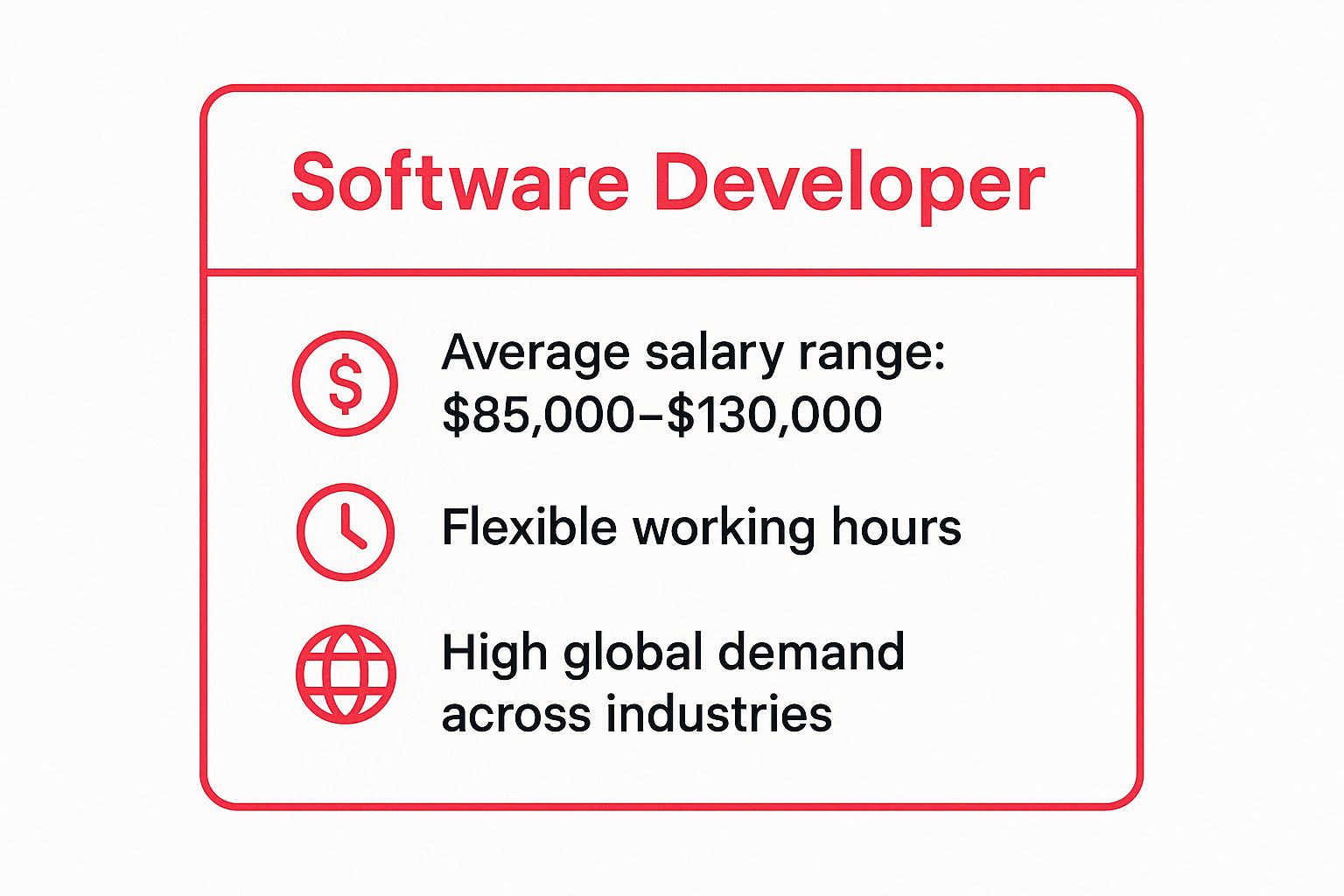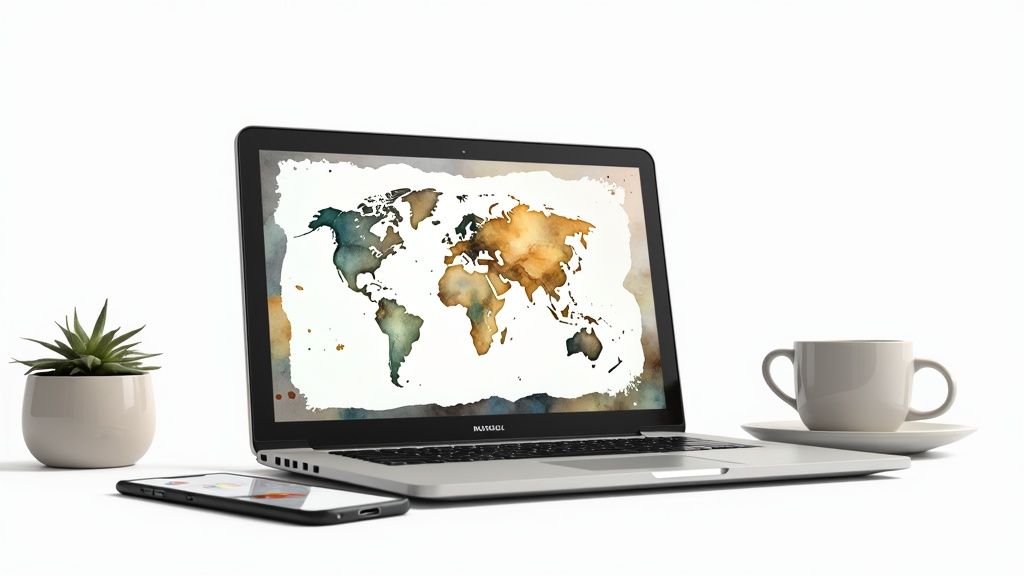The professional landscape has shifted dramatically, with remote work transforming from a niche perk into a mainstream reality. Today, the freedom to design your workday and choose your environment is more accessible than ever. But which paths offer the most stability, growth, and fulfillment? This guide cuts through the noise to detail the top 9 best careers for working remotely in 2025. We will move beyond generic job titles to provide a comprehensive breakdown of what truly makes these roles successful in a distributed work model.
Inside this detailed roundup, you will discover:
- In-depth Role Descriptions: A clear look at the day-to-day responsibilities for positions like Software Developer, Data Analyst, and Cybersecurity Specialist.
- Essential Skills & Tools: The specific hard and soft skills, plus the software, you need to master.
- Realistic Salary Expectations: Up-to-date salary ranges you can anticipate based on experience and location.
- Actionable “How to Break In” Steps: A practical, step-by-step guide for each career path to help you land your first remote role.
Whether you’re a seasoned professional seeking a change or just starting your career, this article provides a practical roadmap to help you find a position that aligns with your skills and lifestyle goals, all from the comfort of your home office.
1. Software Developer
Software development consistently ranks as one of the best careers for working remotely due to its project-based nature and reliance on digital tools. Developers design, build, and maintain the software and applications we use daily, a task that requires deep focus and can be performed from anywhere with a stable internet connection. Companies like GitLab and Automattic have pioneered all-remote workforces, proving that complex software can be built by globally distributed teams.
The core of a developer’s work involves writing code, collaborating on platforms like GitHub, and solving complex problems, all of which translate seamlessly to a remote environment. This flexibility allows developers to structure their workdays for maximum productivity, making it an ideal long-term career path.
Key Data at a Glance
For a quick reference, the infographic below summarizes the most compelling reasons to consider a remote software development career.

The combination of high earning potential and strong global demand makes this field not only lucrative but also incredibly stable for remote professionals.
How to Break In
- Build a Portfolio: Create a strong GitHub profile showcasing diverse projects. This serves as your resume and demonstrates practical skills.
- Learn In-Demand Languages: Focus on languages like Python, JavaScript, and frameworks like React, which are highly sought after by remote companies.
- Contribute to Open Source: Participating in open-source projects shows initiative, collaboration skills, and an ability to work within established codebases. If you’re wondering what skills companies look for, you can learn more about hiring remote software developers to better align your learning path.
2. Digital Marketing Specialist
Digital marketing is a powerhouse career for remote work because its success is measured by online results, not physical presence. Specialists develop and run campaigns across digital channels like social media, search engines, and email, tasks that rely entirely on digital tools and data analysis. Companies like HubSpot and Mailchimp have demonstrated how effective and innovative remote marketing teams can be, setting a strong precedent for the industry.
The role involves a mix of creativity and analytics, from crafting compelling ad copy to interpreting campaign data to optimize for return on investment. This entire workflow, managed through platforms like Google Analytics, SEMrush, and various social media dashboards, is perfectly suited for a distributed team, making it one of the best careers for working remotely.
Key Data at a Glance
For a quick reference, the infographic below summarizes the most compelling reasons to consider a remote digital marketing career.
The strong demand for specialized skills and the ability to directly impact business growth make this an exciting and stable path for remote professionals.
How to Break In
- Get Certified: Earn certifications in Google Analytics and Google Ads to validate your technical skills. These are foundational and highly respected by employers.
- Specialize and Build Expertise: Focus on a specific area like SEO, PPC, or social media marketing for platforms like LinkedIn. Deep knowledge in one niche is more valuable than surface-level understanding of many.
- Create a Portfolio of Results: Develop case studies that showcase your campaign successes with concrete data. A portfolio demonstrating how you achieved a specific ROI is more powerful than a resume. If you’re looking for a good starting point, you can explore the best certifications for remote jobs to build a strong foundation.
3. Graphic Designer
Graphic design has become one of the best careers for working remotely, as creativity and digital tools transcend physical office spaces. Designers create the visual identities for brands, websites, and marketing materials, a job that thrives on focused, independent work. The industry’s reliance on powerful software and cloud-based collaboration platforms means designers can deliver high-quality work and communicate with clients from anywhere.

The core of a graphic designer’s role involves translating ideas into visual concepts, a process well-suited for a flexible schedule. Success stories from platforms like Behance and Dribbble showcase how designers build thriving freelance careers and work with global clients, proving that talent and a strong portfolio are the most important assets in this remote-friendly field. This autonomy allows for a better work-life balance and a diverse, ever-changing project load.
Key Data at a Glance
For a quick reference, the infographic below summarizes the most compelling reasons to consider a remote graphic design career.
The combination of creative expression and a robust freelance market makes this a highly rewarding path for independent professionals.
How to Break In
- Master Industry-Standard Software: Proficiency in the Adobe Creative Suite (Photoshop, Illustrator, InDesign) is non-negotiable for most professional roles.
- Develop a Niche Specialization: Focus on a specific area like UI/UX design, branding, or motion graphics to stand out in a competitive market.
- Build a Strong Online Portfolio: Your portfolio is your primary marketing tool. Curate your best work on platforms like Behance or Dribbble to showcase your skills and style.
- Network Through Design Communities: Engage with other designers and potential clients on social media and specialized platforms to build your professional circle. For those branching into marketing design, it’s also wise to prepare. Reviewing common digital marketing interview questions for 2025 can give you a significant edge.
4. Content Writer/Copywriter
Content writing and copywriting are premier choices among the best careers for working remotely, centering on skills that thrive in a focused, autonomous environment. Writers create the compelling text for blogs, websites, marketing emails, and social media, a task requiring only a laptop and a reliable internet connection. Success stories from platforms like Contently and ClearVoice showcase how freelance writers build thriving careers without ever stepping into a traditional office.
The essence of a writer’s job involves in-depth research, crafting engaging narratives, and producing persuasive copy, all of which are perfectly suited for remote work. This career path offers the flexibility to manage deadlines and creative energy effectively, making it a sustainable and rewarding choice for those with a passion for words.
Key Data at a Glance
For a quick reference, the infographic below summarizes the most compelling reasons to consider a remote content writing career.
The blend of creative fulfillment, flexible scheduling, and strong demand makes this field a highly attractive and stable option for remote professionals.
How to Break In
- Develop a Niche: Specialize in high-demand sectors like technology, healthcare, or finance to command higher rates and attract quality clients.
- Master SEO Fundamentals: Learn search engine optimization (SEO) and keyword research to create content that ranks well and drives organic traffic, a skill nearly all remote companies value.
- Build a Diverse Portfolio: Create a portfolio with varied samples, such as blog posts, case studies, and email copy, to demonstrate your versatility. It’s crucial to present these skills effectively, and you can see a variety of work-from-home resume samples to learn how to best highlight your writing projects.
- Build Relationships with Agencies: Connect with content marketing agencies that can provide a steady stream of work and help you build a strong professional network.
5. Virtual Assistant
The role of a Virtual Assistant (VA) has become a cornerstone of the remote work landscape, offering essential administrative, technical, and creative support to businesses and entrepreneurs. VAs perform a wide range of tasks from a remote location, including managing emails, scheduling appointments, handling social media accounts, and coordinating projects. This flexibility allows businesses to access top-tier support without the overhead of an in-office employee.
A VA’s work is inherently remote, relying on cloud-based tools like Google Workspace, Slack, and Trello to collaborate with clients across the globe. This structure enables VAs to build a diverse client portfolio, often specializing in high-demand niches like marketing or bookkeeping. The autonomy and variety make it one of the best careers for working remotely for those with strong organizational skills.
Key Data at a Glance
For a quick reference, the infographic below summarizes the most compelling reasons to consider a remote virtual assistant career.
The combination of flexible work arrangements and the ability to specialize makes this a stable and adaptable career for remote professionals.
How to Break In
- Specialize in High-Value Services: Focus on in-demand skills like social media management, bookkeeping, or podcast editing to command higher rates.
- Build an Online Presence: Create a professional website or a strong profile on platforms like Upwork or LinkedIn to showcase your services, testimonials, and portfolio.
- Develop Standard Operating Procedures (SOPs): Create clear, documented processes for your tasks. This demonstrates professionalism and makes it easier to onboard new clients efficiently. As you grow, understanding the full picture is key; you can learn more about the pros and cons of remote work to better manage client expectations and your own work-life balance.
6. Data Analyst
Data analysis is one of the best careers for working remotely because it centers on interpreting digital information, a task perfectly suited for a distributed environment. Analysts collect, clean, and analyze large datasets to uncover trends and provide insights that drive business decisions. With the rise of cloud-based databases and analytics platforms, analysts can securely access and manipulate data from anywhere, making physical presence unnecessary.
The role involves transforming raw numbers into clear, actionable intelligence using statistical methods and visualization tools. This focus-intensive work thrives in a remote setting, where analysts can create their own environment for deep concentration. Companies like Netflix and Spotify rely heavily on remote data teams to refine their products, proving the effectiveness of distributed analytics.
Key Data at a Glance
The infographic below offers a snapshot of the compelling reasons to pursue a career as a remote data analyst, highlighting its strong earning potential and high demand.

This blend of competitive salary and essential business function makes data analysis a stable and rewarding remote career path.
How to Break In
- Master Foundational Tools: Become an expert in SQL for data querying and Excel for data manipulation. These are non-negotiable skills for almost every analyst role.
- Learn a Programming Language: Gain proficiency in Python or R. These languages have powerful libraries (like Pandas and Dplyr) specifically designed for advanced data analysis and statistical modeling.
- Develop Visualization Skills: Learn to use tools like Tableau or Power BI to create compelling dashboards and reports. Effectively communicating your findings is as important as the analysis itself.
- Build a Portfolio: Showcase your skills by completing analysis projects on platforms like Kaggle. Document your process from data cleaning to final insights to demonstrate practical expertise.
7. UX/UI Designer
User Experience (UX) and User Interface (UI) design is a rapidly growing field that has become one of the best careers for working remotely. Designers in this space are responsible for making technology user-friendly, intuitive, and enjoyable. Their work, which involves research, wireframing, prototyping, and visual design, is highly compatible with a remote setup using collaborative tools like Figma and InVision, which allow entire teams to work on the same project in real-time.
The core of a UX/UI designer’s role is to advocate for the user, ensuring that digital products are both beautiful and functional. This creative and analytical work thrives in a focused environment, making remote work an excellent fit. Companies like Airbnb and countless remote-first agencies have demonstrated that impactful, user-centered design can be achieved by distributed teams.
Key Data at a Glance
For a quick reference, the video below summarizes what it takes to succeed as a UX/UI designer and why it’s a compelling remote career.
The blend of creative problem-solving and technical skill makes this field both personally rewarding and financially stable for remote professionals.
How to Break In
- Master Industry-Standard Tools: Gain proficiency in tools like Figma, Sketch, and Adobe XD, as these are the cornerstones of modern design workflows.
- Build a Strong Portfolio: Your portfolio is more important than a resume. Create detailed case studies that explain your design process, from user research to the final visuals.
- Understand Design Principles: Learn the fundamentals of user-centered design, information architecture, and usability. Stay current with emerging design trends and patterns to keep your skills sharp.
- Learn Basic Front-End Concepts: While you don’t need to be a coder, understanding HTML, CSS, and JavaScript basics will help you collaborate effectively with developers and design more practical solutions.
8. Online Tutor/Course Creator
Online education has transformed from a niche market into a mainstream industry, establishing online tutoring and course creation as premier careers for working remotely. Professionals in this field leverage their expertise to teach students globally, either through live, one-on-one sessions or by creating scalable digital courses. This career path is fueled by a demand for flexible, accessible learning and the proliferation of platforms like Coursera and Udemy.
The work involves designing curriculum, producing educational content like videos or worksheets, and engaging with a community of learners. Whether teaching a language, a professional skill, or a creative hobby, the core tasks are perfectly suited for a remote setup. This autonomy allows educators to build a business around their passion, offering a fulfilling and impactful career.
Key Data at a Glance
For a quick reference, the infographic below summarizes the most compelling reasons to consider a remote online education career.
The potential for scalable, passive income combined with the freedom to teach any subject makes this a uniquely attractive remote profession.
How to Break In
- Choose a Profitable Niche: Identify a subject where you possess deep expertise and there is a clear market demand from learners.
- Start with Free Content: Build an audience and establish credibility by offering free tutorials, webinars, or guides on platforms like YouTube or a personal blog.
- Invest in Quality Equipment: Good audio and video quality are non-negotiable for creating professional content. A decent microphone and camera are essential first investments.
- Engage and Iterate: Actively gather feedback from your first students or audience members to refine your teaching style and course material for maximum impact.
9. Cybersecurity Specialist
As organizations increasingly operate in the digital realm, the need to protect sensitive data from cyber threats has made cybersecurity one of the best careers for working remotely. Specialists in this field design and implement security measures, monitor networks for breaches, and respond to incidents, tasks that are heavily reliant on cloud-based security platforms and remote access tools. Companies like CrowdStrike have built their entire security operations around a distributed model, showcasing that effective threat hunting and response can be managed from anywhere.
The core responsibilities of a cybersecurity specialist, such as vulnerability assessments, penetration testing, and security protocol development, translate exceptionally well to a remote setup. This independence allows for the deep concentration required to analyze complex threats and secure digital infrastructures, making it a sustainable and high-demand remote career.
Key Data at a Glance
A quick look at the infographic below highlights the compelling reasons why a remote cybersecurity career is a strong choice for tech professionals.
The combination of excellent earning potential and the critical importance of the role ensures a stable and rewarding career path for remote experts.
How to Break In
- Earn Industry Certifications: Obtain credentials like CompTIA Security+, Certified Ethical Hacker (CEH), or CISSP to validate your skills and knowledge to employers.
- Build a Home Lab: Set up a personal virtual environment to practice security concepts, test tools, and simulate attacks without risk. This demonstrates hands-on experience.
- Develop Scripting Skills: Proficiency in scripting languages like Python or PowerShell is crucial for automating security tasks, analyzing data, and developing custom tools.
- Stay Current with Threat Intelligence: Actively follow security news, blogs from experts like Brian Krebs, and reports from institutions like the SANS Institute to understand emerging threats. As a remote professional, it’s vital to stay sharp, and you can read more on cybersecurity for remote workers to enhance your own security posture.
Top 9 Remote Careers Comparison
| Role | Implementation Complexity 🔄 | Resource Requirements ⚡ | Expected Outcomes 📊 | Ideal Use Cases 💡 | Key Advantages ⭐ |
|---|---|---|---|---|---|
| Software Developer | Moderate to High due to coding and system knowledge | High: computers, development environments | High-quality software, problem-solving solutions | App/software development, remote coding teams | High salary, flexible hours, global demand |
| Digital Marketing Specialist | Moderate: managing campaigns across channels | Moderate: analytics tools, ad budgets | Measurable ROI, increased online presence | Online advertising, brand promotion | Creative-analytical balance, growing industry |
| Graphic Designer | Moderate: creative design with client feedback | Moderate to High: design software, hardware | Visually appealing content, brand identity | Visual content creation, freelance projects | Creative satisfaction, flexible projects |
| Content Writer/Copywriter | Low to Moderate: writing and research skills | Low: computer, internet | Engaging written content, SEO optimization | Content creation, marketing copy | Low startup cost, flexible, scalable income |
| Virtual Assistant | Low: administrative and support tasks | Low: basic tech, communication tools | Efficient task management, client support | Admin support, scheduling, customer management | Low entry barrier, flexible schedule |
| Data Analyst | High: statistical analysis, data modeling | Moderate: analytical software, databases | Actionable business insights, data-driven decisions | Business analytics, reporting, trend analysis | Strong job growth, measurable impact |
| UX/UI Designer | Moderate to High: user research and interface design | Moderate to High: design/prototyping tools | Optimized user experience and interface | Website/app design, usability improvement | High demand, creative + analytical role |
| Online Tutor/Course Creator | Moderate: teaching and content creation | Low to Moderate: video/audio equipment | Educational impact, multiple revenue streams | E-learning, virtual instruction | Flexible schedule, passive income potential |
| Cybersecurity Specialist | High: security protocols and threat analysis | High: security software, monitoring tools | Protection against cyber threats, incident response | IT security, risk assessment, compliance | High salary, job security, critical organizational role |
Your Next Step: Finding Your Place in the Remote World
Embarking on a new career path is a monumental decision, but the digital transformation of the global workforce has unlocked unprecedented opportunities. The roles we’ve explored, from the analytical precision of a Data Analyst to the creative flair of a Graphic Designer, represent more than just jobs; they are gateways to a lifestyle defined by autonomy and flexibility. The common thread connecting these diverse fields is their fundamental compatibility with a remote-first model, offering high demand, significant growth potential, and strong compensation.
The journey from aspiring remote worker to seasoned professional begins with a single, decisive step. The best careers for working remotely are not reserved for a select few; they are accessible to anyone with the drive to learn, adapt, and demonstrate their value in a digital landscape. Your primary task now is to translate this newfound knowledge into a concrete plan of action.
Crafting Your Action Plan
To move forward effectively, you need a structured approach. Vague goals lead to vague results. Instead, focus on tangible, measurable steps that build momentum and confidence.
Self-Assessment and Alignment: Revisit the career profiles in this article. Which one genuinely excites you? Consider your innate talents, your professional interests, and the kind of work you find fulfilling. Aligning your passion with market demand is the cornerstone of a sustainable remote career. For example, if you love solving complex puzzles and working with numbers, a path in data analytics or cybersecurity could be a perfect fit.
Strategic Skill Development: Once you’ve identified a target role, perform a gap analysis. What skills do you currently possess, and what skills do you need to acquire? Create a learning roadmap. This could involve enrolling in online courses, earning certifications, or tackling hands-on projects to build a robust portfolio that speaks louder than any resume.
Mastering the Virtual Arena: The remote hiring process has its own unique set of rules. As you embark on your remote job search, mastering the interview process is paramount. Since you won’t be meeting in person, your ability to communicate effectively on camera is critical. Get expert advice on how to prepare for a video interview and win the job to ensure you make a stellar impression and showcase your professionalism.
Embrace the Future of Work
The shift to remote work is not a fleeting trend; it’s a fundamental restructuring of how we define the workplace. By pursuing one of these dynamic career paths, you are not just finding a new job, you are investing in a future-proof skill set. You are positioning yourself at the forefront of an economic revolution that values results over physical presence and empowers individuals to design a life that integrates work, not one that revolves around it. The path is clear, the tools are available, and the demand is undeniable. Your location-independent future is waiting for you to build it.
Ready to find the perfect role that matches your skills and ambitions? Stop sifting through endless noise and generic postings. Remote First Jobs curates only the best, high-quality remote opportunities, connecting talented professionals like you directly with innovative companies. Start your search on Remote First Jobs today and take the first real step toward your ideal remote career.




